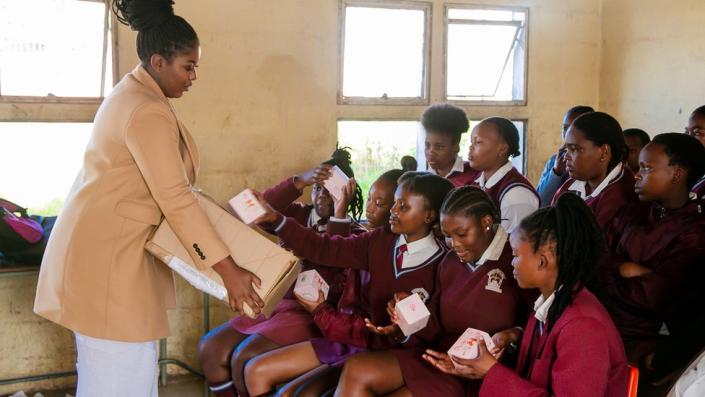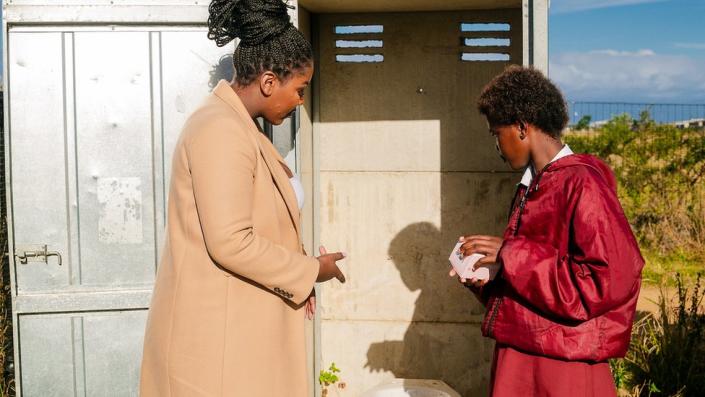
Tamara Magwashu was bullied at school because her family wasn’t wealthy enough to afford sanitary pads.
Now 27, she grew up in a poor township in South Africa’s Eastern Cape province and watched her single mother use old rags during her period.
Tamara took at least a week off school during her period and had to learn how to fold and use the rags, which were very uncomfortable.
This scarring experience motivated her as an adult.
“I made the choice deep down that I didn’t want anyone else to go through what I did,” she told the BBC.
“So I had the idea of starting my own business, to eradicate period poverty.”
She now delivers sanitary napkins to hundreds of schools in the Eastern Cape.
“Grew up in a cabin”
Her work has been recognized by her community and she was nominated for this year’s Forbes magazine’s 30 under 30 list, which features young activists and entrepreneurs from around the world.
Describing her upbringing in the township of Duncan Village in the city of East London, Tamara says she has lived her whole life “in a shack – never had windows, never had [piped] water”.
She decided to get part-time jobs after school to try to make ends meet for her family – and to help out when she was on her period.
“I started working as soon as I could around my studies to be able to buy sanitary pads because for me these cloths were very uncomfortable.”
Tamara also says that as a teenager, it was very difficult for her to understand why she had period pain, as there was very little education about menstruation.
She was not alone in this struggle.
The anti-poverty NGO The Borgen Project estimates that seven million South African girls cannot afford sanitary products.
Around the world, the World Bank says that at least 500 million women and girls do not have access to the facilities they need during their period.
UN Women estimates that 1.25 billion women and girls worldwide do not have a safe private toilet to go to.
And so it is for Tamara and her family. They share public toilets with about 50 other people in his township.
Although South Africa is one of the richest countries on the continent, the young businesswoman believes she only “shines from the outside”.
When she went to the University of Johannesburg to study public relations, Tamara managed to start saving money from her student loan as well as earnings from her part-time jobs to start her own business, in the goal of making a difference for women and girls in her community.
She had to be self-sufficient because she had tried to get a business loan, but no one wanted to take a risk on her because she had no assets in her name.
She eventually started the business in 2021 with the goal of selling affordable menstrual products to underprivileged women.
She called it Azosule, which means “wipe away every tear from their eyes” in the Xhosa language of South Africa.
It also has a charity arm, using part of its profits. Tamara created the ‘She Needs You’ campaign where she visits schools in rural areas to deliver free sanitary napkins.
The Borgen Project estimates that around 30% of girls there miss school during their periods because they don’t have access to hygienic products.
“It was like Christmas”
Her former high school principal is proud of her work.
“She helped the girls so much. She brought so many towels that the girls have enough for six months – it was like Christmas for them,” says Thazea Mnyaka.
“These girls come from disadvantaged backgrounds where their only meals may come from school, how can they buy sanitary products?”
Additionally, Tamara does local block drives on the street, where she distributes her products in marginalized communities.
Yazini Kuse is a reporter, also from Duncan Village, and she was the first reporter to cover what Tamara was doing.
“I was captivated by her work. She defends the dignity of young girls and the human rights of women because we don’t have much.
“She’s working to restore that,” she told the BBC.
“Despite being in this situation of poverty herself, she is trying to improve the lives of others, which is incredible – she is a living testimony to the importance of this.”

There are others in the country working on the same problem.
Nokuzola Ndwandwe is an activist from Durban who successfully won a sales tax on discarded tampons in South Africa and is working to pass a bill focusing on menstrual hygiene.
The Menstrual Health Rights Bill is supported by a collective of 31 organizations who campaign for free menstrual products and want the South African government to recognize menstrual health as a human rights issue.
She said, “We wanted [the tax] scrapped on products because they are expensive. We are in talks with key members of the state and UN Women.
“It is important that we empower young women. Women and girls in rural areas like Tamara should continue to raise their voices and speak out.”
Tamara is ambitious and wants to eventually expand her work to other African countries. She also wants men to be aware of the importance of breaking taboos.
“Menstrual poverty is not a women’s problem, it’s a society problem,” she says, “and until we can understand that we’re not going to move on.”